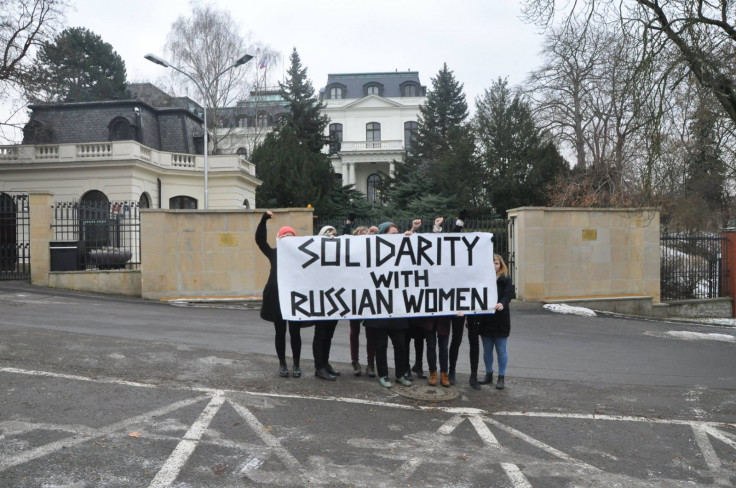Moscow denies women right to protest over bill decriminalising domestic violence
The women have had a protest permit against the bill rejected a second time.

The lower house of the Russian parliament has approved a bill decriminalising domestic violence on 27 January – while a women's group which is organising a rally against the bill has seen its request for a protest permit denied a second time from the Moscow government authorities.
The bill was approved by an overwhelming majority of the State Duma, as the lower house of parliament is called. A total of 380 lawmakers voted in favour, and only three against, the Moscow Times reported. It now needs a vote in the upper house of parliament before being signed into law by President Vladimir Putin.
One of the MPs voting against the bill hails from the ranks of the same conservative party as the woman who first proposed the law. Sergey Shargunov wrote a post on Facebook explaining his opposition to the bill.
"There was no reason to revise the old rules, since many women and children suffer at the hands of sadistic family members. Article 21 of the constitution prohibits violence. And now instead domestic violence will be treated as if it were normal," Shagurnov said in the post.
But while Shagurnov had an opportunity and a platform to voice his dissent as a lawmaker, the women's group is still seeking to exercise their right to protest the bill.
After seeing their first request denied on shaky grounds, the women filed a new application to hold a rally on 4 February at Sokolniki Park in the northern part of the Russian capital. The request was denied on 27 January. The Moscow mayor's office said the permit stated the protest venue "incorrectly".
The protest organisers, who know their rights as the three women who started the group were all students at Moscow State Academy of Law, are now planning on asking for another permit for the rally directly to the park's authorities.
They had first asked for permission to hold a rally against the ban on 28 January, in Moscow's Bolotnaya Square, a largely pedestrian area south of the Kremlin and the Red Square where a mass rally against President Vladimir Putin was held in 2012. The request was denied on the basis that the stated number of participants was too high for the location chosen, and that holding the event would interfere with the movement of pedestrians and vehicles across the city, "violating the rights of the citizens" who are not participating in this event.
"We understood that everything possible would be done to make us keep silent but it was a surprise that government played unlawfully," one of the group's spokespersons, Maria Kogan, told IBTimes UK after the permit was denied. "The fact that we have to ask permission for our constitutional right is sad in and of itself, and the reasons of denial are baseless."
Messages of solidarity to Russian women were sent from Poland, Armenia and the Czech Republic, where a group of women from the Christian feminists RFK group picketed the Russian embassy in Prague holding a banner reading "Solidarity with Russian women".
According to official figures quoted by the UK foreign office, 12,000 women are killed in episodes of domestic violence in Russia annually, one every 40 minutes. The scale of the problem is slowly gaining momentum in the country. In 2016, a social media campaign invited people to share their experiences of sexual assault, domestic abuse and gender-based violence using the hashtag: "I am not afraid to speak." Thousands of stories poured in, breaking the wall of silence.
How the law would change
The bill makes domestic violence - defined as the beating received by a relative - a civil offence, punishable with a fine of up to 30,000 roubles (£405), arrest lasting between 10 or 15 days, or 60 to 120 hours of compulsory labour (which was introduced at the beginning of the year as an alternative to imprisonment).
It would be treated as a criminal offence should the beating occur more than once a year, or if the crime was perpetrated as an act of hooliganism (which in Russian law encompasses any breach of public order) or is motivated by hatred or enmity. In this case, the punishment would be either compulsory labour or imprisonment up to two years.
© Copyright IBTimes 2025. All rights reserved.






















